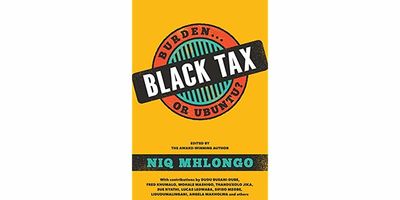'Black Tax' is a New Book Exploring the Toll on Black South Africans Supporting Their Families
Sometimes taking care of our families 'back home' is more a burden than it is a privilege.
When I finished my final year of high school, I was anxious about how I would fund my studies at universities. Fortunately, I received a scholarship which would take care of all my financial needs. This was during the time when I had lost my father and my mother had moved back to my grandmother's house in Zimbabwe with my brothers because we had lost pretty much everything. Part of what excited me about the scholarship was that I'd be getting an allowance to do with as I pleased. It wasn't a lot of money, but it was certainly more than I'd had in years.
I'd had two pairs of shoes over the past few years and the prospect of not struggling so much anymore was both relieving and exciting. That was until my grandmother called me to the kitchen, and explained just how I would spend that money. "You will send half of it to your mother." She added that, "There is electricity to be paid and food to be bought here." It was not a request but rather an instruction. She went on to remind me of her words every day until I felt so burdened by them that I wished I had never received the scholarship in the first place. And that right there, is what we mean when we speak of "black tax".
Black Tax is a collection of contributions by various South African writers including Mohale Mahigo, Fred Khumalo and Angela Makholwa, among several others, and is edited by award-winning author, Niq Mhlongo. The anthology addresses what black tax is, its historical roots and acknowledges the two primary dichotomies that exist within what is still a considerably complex—ubuntu as well as burden. Ubuntu is an African ethos and way of living that says that umuntu ngumuntu ngabantu—a person is who they are because of others. As Black people and as Africans, we are defined by this ethos. It is the rock upon which we have built our families and communities and the reason behind the "warmth" tourists often describe when they visit African countries. However, as great as this ethos is, it does lend itself to abuse and that's where the burden comes in.
In Sibongile Fisher's contribution As We Tithe, she describes black tax as both a virtue and a vice and probes the dichotomy even further by asking these pertinent questions: "Providing for your loved ones is innate but when is it enough? How much is enough? And where does being a provider end and being an enabler begin?" Fisher adds poignantly that, "We break the bank. We break our bodies. We break bread." This is a reality to which many Black Africans can relate.
There's a reason why Black families fuss over first-generation university graduates. Not only does obtaining a degree signify having triumphed in institutions that have historically excluded Black people, but it also represents the hope that Black families often have that their collective lives will now change. A degree means a job which means money and ultimately the opportunity to escape poverty and lack. That first salary and the ones that follow, become a lifeline for the rest of the family "back home".
"So who is supposed to look after your family then?" you're probably asking. "Should we let them starve?" Of course not. I've yet to meet a Black person who doesn't lose sleep thinking about how they can better the lives of those back home or how they can do with less if it means their families can have just enough. I'm not bashing our ability as Black people to take care of our families and the generations of our people who've been trapped in the endless cycle of unemployment and poverty and continue to struggle in a system set up against them.
"Too often we speak of the privilege it is to be in a position to change the circumstances of our families and not enough about the burden that is placed on a single individual."
In Nokubonga Mkhize's contribution The Power of Black Tax, she proposes that the way to overcome the burden of black tax is to practice good financial discipline and wealth goals—something she admits upfront will not happen overnight. While Monde Nkasawe acknowledges the challenges that black tax brings in his contribution A Moment to the Survival of the African Family, he says that it has kept "black familial connections from wholesale colonial destruction" and provided a form of social security. The pervasive sentiment throughout the book is, however, that we should pay our black tax because if not us, then who?
I like how Nelisa Ngqulana once put it. She said that Black parents often see their children as investments that will eventually yield them returns. That needs to change. Children are not investments, they're children. And thinking otherwise is partly what leads to the gross manipulation that then happens when we're adults who are told that we "owe" our parents.
Black tax has become such a norm in Black culture. We're afraid of being accused of casting our beliefs aside as a people and "abandoning" our loved ones. That shouldn't be the case. We're all trying to survive in a system that has robbed the majority and advantaged a select few. The only way we can genuinely get around easing the burden that rests on the shoulders of the (somewhat) privileged, is by constantly talking about the uncomfortable parts too. I think that is true ubuntu.
